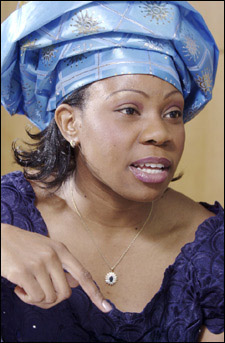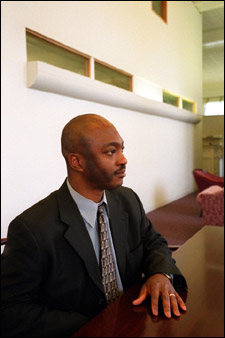The African connection:
Communication, resource network set up for African organizations around the University community

Harvard’s African students have created a new network that seeks to link disparate African organizations across the University and become a resource for African students, faculty, and other members of the Harvard community.
The Harvard Africa Network was founded by Akudo Anyanwu, a School of Public Health student from Nigeria, with support from a team of seven other founding members at Harvard’s graduate schools.
Anyanwu said she got the idea after attending several events sponsored by Africa-focused organizations at Harvard’s schools. Anyanwu said these were wonderful events, but they seemed disconnected from each other.
“It came from having gone to so many Africa-related events at Harvard this year and seeing the beauty in it, but also seeing the disconnect,” Anyanwu said.
After three months in the making, the network hosted its first activity in early May, a talk by the chair of African Studies, Professor of African History Emmanuel Akyeampong. The event, which drew about 85, was held in Boylston Hall’s Ticknor Lounge and sponsored by the Committee on African Studies.
The network has also compiled a directory of graduate students and faculty, which includes names, contact information, and some brief background information. It has also developed an e-mail list of about 180 people.
“We want graduate research projects to come out of this group. We want jobs to come out of it. We want graduate students from Africa to know there are resources in all schools for them, not just in the school where they’re studying,” Anyanwu said.

Anyanwu, who will be returning to Nigeria after graduating this spring, said the network is already planning a fall networking event, similar to the Akyeampong event this month. She said they are also planning a Harvard-wide Africa conference to keep the interdisciplinary discussion of Africa’s needs going.
Fostering interdisciplinary collaboration, she said, is one of the network’s goals because so many of Africa’s problems, such as AIDS, require multipronged responses to be effective.
“A lot of Africa’s problems are such that you need an integrated approach to solve them,” Anyanwu said. “It was clear that this has been lacking.”
Anyanwu was encouraged, however, by the show of talent at the first event. She said there were many dual-degree candidates, Ph.D.s who were back in school seeking masters degrees, in diverse fields from health to children’s entertainment.
“Each individual who was in the room has great potential,” Anyanwu said. “They have amazing qualifications and diverse interests.”
Anyanwu herself has an accomplished background. She graduated last spring from Tufts University Medical School and will be returning to Nigeria to work for a year in the National Primary Healthcare Development Agency before coming back to the United States to complete her residency. She eventually wants to work in infectious disease control and on domestic violence issues.




